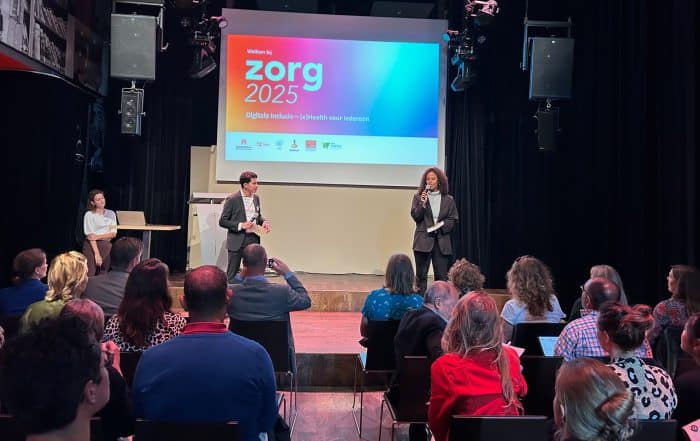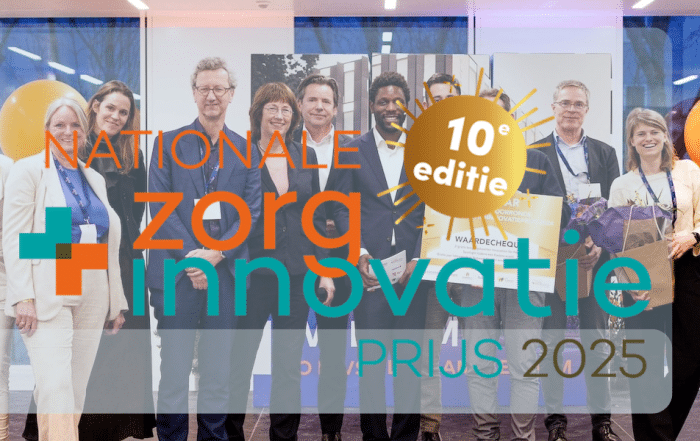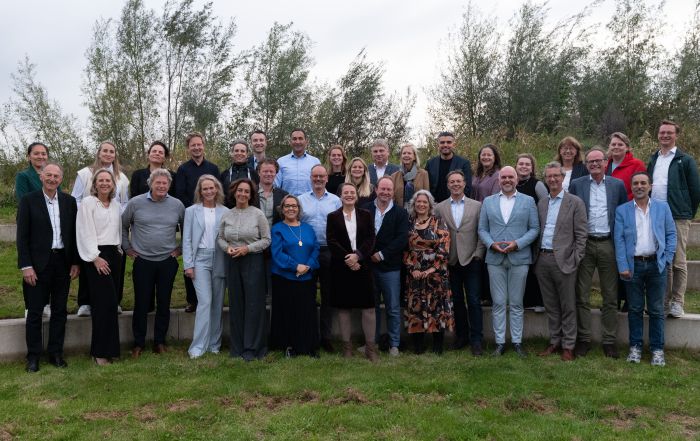AI in the hospital: physician or assistant?
What role will AI play in healthcare five years from now? What opportunities does AI offer in solving healthcare challenges? And what ethical considerations do we make in the process? These questions were the focus of the Zorg2025 meeting, held on 5 November.
De middag start met een theatrale monoloog. Het is 2034 en aan het woord is Vera Versteeg, een fictieve internist die voor de tuchtrechter moet verschijnen. Ze zag een tumor over het hoofd bij een van haar patiënten, omdat haar AI-tool die ook niet vaststelde. “Ik ben het nu, maar jij kunt het morgen zijn”, zegt ze tegen de zaal. “Want hoe kun je richtingsgevoel ontwikkelen als je nooit zelf hoeft te navigeren?”
Zorgen voor AI
Actrice Margo Verhoeven laat in de korte voorstelling ‘Zorgen voor AI’ zien tegen welke ethische dilemma’s kunstmatige intelligentie in de zorg kan aanlopen. Haar monoloog bij deze 19e Zorg2025-bijeenkomst gaat over de samenwerking tussen artsen en algoritmes. De voorstelling van theatermakers Nieuwe Helden is gebaseerd op een grootschalig 5-jarig UvA-onderzoek naar digitalisering van de zorg. Hoofdonderzoeker en toekomstantropoloog Roanne van Voorst denkt voor haar onderzoek met artsen en verpleegkundigen na over ethische dilemma’s die gepaard gaan met de ontwikkeling en adoptie van AI in ziekenhuizen.
Ethische stellingen
Na de monoloog nemen Sebastiaan Berendsen en Corrette Ploem het podium over. Berendsen werkt bij Deloitte aan verantwoorde AI en promoveert aan de UvA op dit onderwerp. Ploem is bijzonder hoogleraar Recht, zorgtechnologie en geneeskunde bij Amsterdam UMC.
Onder leiding van moderator Niel Oedit Doebé, lid van Young on Board, gaan zij met elkaar én de zaal in gesprek over de ethische dilemma’s rondom AI in de zorg. Dat doen zij aan de hand van stellingen.
AI in de zorg mag nooit een vervanging zijn voor menselijk contact tussen zorgverleners en patiënten
In de zaal is ongeveer de helft het oneens met de stelling, maar Ploem is juist een groot voorstander. “Een goede arts beslist samen met de patiënt. Dat is een continu proces, waarin juist de menselijke kant van het vak belangrijk is. AI kan dat nooit vervangen.” Maar, zo klinkt het uit de zaal: in het echte leven ontkomen we hier niet aan, om überhaupt genoeg zorg te kunnen blijven bieden, in tijden van personeelsgebrek en vergrijzing.
“Dementerenden zitten thuis met hun mantelzorgers, casemanagers hebben gigantische workloads. Dat is geen houdbare situatie. Social AI en conversational AI kunnen hierbij wel degelijk dat menselijke contact vervangen.” En, een andere gedachte vanuit de zaal: “er groeit nu natuurlijk ook een generatie op die het juist prettig vindt om niet met een mens, maar met een chatbot contact te hebben.”
Geef AI de medische verantwoordelijkheid en niet de arts. AI wordt immers niet beïnvloed door menselijke factoren
Slechts een paar mensen zijn het met deze stelling eens. Zou het niet heel veel juridisch gedoe schelen als we AI overal de schuld van kunnen geven, vraagt een van hen zich af. Berendsen is het niet eens met de stelling: “AI wordt misschien niet beïnvloed door menselijke factoren, maar heeft wel andere gebreken. Datakwaliteit speelt een grote rol. We weten ook dat AI in een nieuwe context niet altijd zo goed werkt.”
Anderzijds wordt het voorbeeld aangehaald van een oncoloog die nog een hele tijd alle AI analyses van scans zelf bleef controleren, en tot de conclusie kwam dat AI metastasen veel beter kon herkennen dan met het menselijk oog, dus dan hijzelf.
Moeten patiënten het recht hebben om AI-gedreven zorg te weigeren, ongeacht de voordelen?
“Het recht heb je natuurlijk altijd”, zegt Berendsen. “Maar of het slim is, is een tweede. Als je dat eist, kan het je relatie met de arts frustreren.” Volgens Ploem maakt het ook hier weer uit over welke vorm het gaat. “Als ik voor een behandeling een smartwatch mee moet nemen, kan ik natuurlijk zeggen: dit is niets voor mij. Maar voor veel screenings wordt nu al standaard gebruik gemaakt van AI. Bijvoorbeeld of iemand van de IC ontslagen kan worden. Als je daar AI weigert, komt het er in feite op neer dat je helemaal geen zorg wilt. Dat is een slechte uitkomst.”
Wat doet AI voor gelijkheid in de gezondheidszorg? En als het tegenwerkt: moeten we AI dan wel inzetten?
Berendsen vindt dat een ingewikkeld vraagstuk. “Sommige AI zal voor een ruime meerderheid een verbetering betekenen, maar voor een minderheid ook een verslechtering. Wat vind je dan toelaatbaar? Dat zul je per geval moeten onderzoeken. En je weet pas wat er gebeurt als je de technologie inzet.”
Iemand uit de zaal interpreteert de stelling over deze vragen juist positief. “Ik hoop dat AI zorgt voor ongelijkheid. Zodat de mensen die de zorg het hardst nodig hebben, betere zorg krijgen.” Die gedachte sluit aan bij wat de gemeente Amsterdam doet, vertelt moderator Oedit Doebé, die er werkt. “Naar sommige wijken zoals Zuidoost gaat bij ons meer geld. Ongelijk investeren voor gelijke kansen, noemen we dat.”
AI-systemen kunnen betere ethische beslissingen in de zorg nemen dan mensen
Berendsen en Ploem verschillen nogal van mening over deze stelling. “AI kan in sommige situaties objectievere beslissingen nemen”, zegt Berendsen. “Beginnend onderzoek laat zien dat je met een combinatie van meerdere AI-systemen tot goede ethische keuzes kunt komen.” Ploem moet er niet aan denken dat dit gebeurt. “Ethische beslissingen zijn zo context-gebonden. Een klein subtiel ding kan een groot verschil maken.”
Terug naar internist Vera Versteeg. Die zei in haar monoloog: “Ik heb het gevoel dat we hebben zitten slapen de afgelopen tien jaar. Het was niet de vraag óf AI de zorg zou gaan veranderen, maar hóé. En dat hoe hebben we uitbesteed aan ontwikkelaars, aan het grote geld. Aan het begin van mijn carrière had ik nog elke dag een multidisciplinair overleg. Nu zit ik de hele dag achter m’n scherm.”
Als het aan de aanwezigen van vandaag ligt, laten we het niet zover komen. En dat is alvast een mooi uitgangspunt.
Tekst: Mirjam Streefkerk
From Zorg2025 to Zorg2040
With 2025 just around the corner, the Zorg2025 coalition will adopt a new name: Zorg2040. This was festively unveiled with a video at the end of the event. https://amsterdameconomicboard.com/wp-content/uploads/2024/11/241104_Zorg2040_Animatie_Zonderloop.mp4 The future of health and prevention also remains central to the Zorg2040 meetings. Amsterdam Economic Board will continue to organise these meetings with Amsterdam AI, Rabobank, ROM InWest and Sigra.
7 November 2024
Read more about
Contact us
Want to keep up to date?
Get the best regional news and events (in Dutch) via the Board Update newsletter
Share this news
Want to keep informed?
Follow us daily on LinkedIn and sign up for the Board Update newsletter.
Read more
- On 14 and 15 October, board members of the Amsterdam Economic Board convened for ...
- Focusing more on women in health care innovation and research will have ...
- What is the Amsterdam Metropolitan Area’s position on critical raw materials? ...




